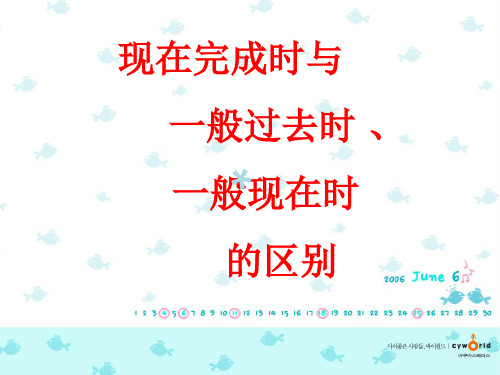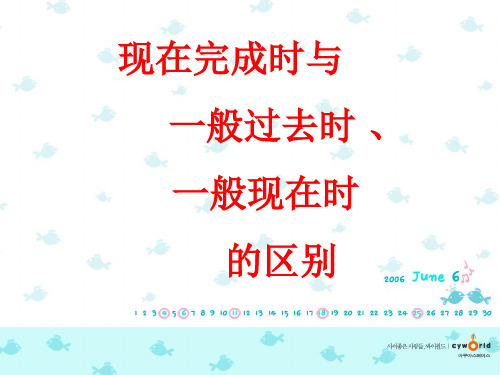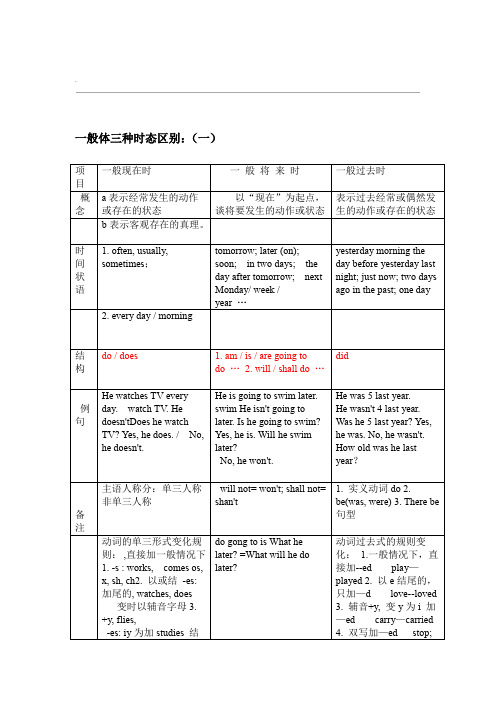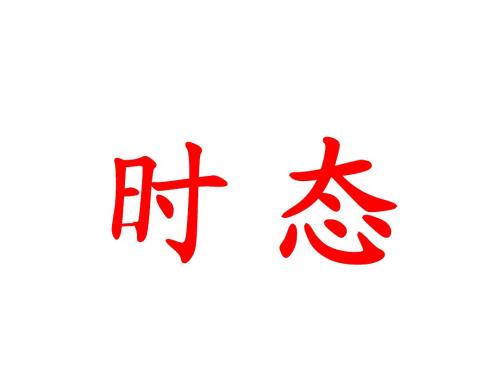一般现在时和一般过去时的区别
一般过去时现在完成时与一般现在时的区别

(二)一般过去时态、现在完成时和 一般现在时的区别
1)现在完成时是表示过去的动作与现在的联 系,主要说明的是现在的情况和状态;而一般 过去时则强调动作发生在过去某一时间,与现 在不发生联系。一般现在时表示经常性,习惯 性的动作或存在的状态.与过去没有关系。 例如:We haven't seen him since last year. 我们自从
He has worked in this factory since 1996.
I have known him since he was a child. 7)so far,in the last / past ……与现在完成时连用。 例如 :
So far,many countries have sent up satellites into space. In the last 30 years, our lives have changed a lot.
He has lived here since he was born. 自他出生 以来一直居住在这儿。(since 自从…以来, 与现在有关,说明他还居住在这儿。)
Liu Mei went to see her grandmother last night . 刘 梅昨晚去看了他外婆。(只说明昨晚)
• 例如:We are good friends(现在情况)
•
我们是好朋友。
• I got to know him in 2005. (过去的动作)
•ቤተ መጻሕፍቲ ባይዱ
我在2005年认识(结识)他
• We have known each other since 2005. (现在完成时把过去的动作和现在联系 起来并着眼于现在)
一般过去时、现在完成时与一般现在时的区别 (1)

(二)一般过去时态、现在完成时和 一般现在时的区别
1)现在完成时是表示过去的动作与现在的联 系,主要说明的是现在的情况和状态;而一般 过去时则强调动作发生在过去某一时间,与现 在不发生联系。一般现在时表示经常性,习惯 性的动作或存在的状态.与过去没有关系。 例如: We haven't seen him since last year. 我们自从
• 例如:We are good friends(现在情况)
•
•
我们是好朋友。
我在2005年认识(结识)他
• I got to know him in 2005. (过去的动作) • We have known each other since 2005. (现在完成时把过去的动作和现在联系 起来并着眼于现在) • 自从2005年来我们就相互认识。
延 续 性 动 词 和 瞬 间 性 动 词 之 间 的 转 化 (keys)
• for和since的运用 since表“自从…… 以来”。
• • • • • • • • 1)since+时间点 He has stayed here since 5 o’clock. 2)since+ 时间段+ ago He has stayed here since 5 hours ago. 3)since+ 从句 She has taught English since he came here.
He has lived here since he was born. 自他出生 以来一直居住在这儿。(since 自从…以来, 与现在有关,说明他还居住在这儿。) Liu Mei went to see her grandmother last night . 刘 梅昨晚去看了他外婆。(只说明昨晚)
区别时态一般现在时一般过去时一般将来时

.一般体三种时态区别:(一);...一般体三种时态综合练习:(一)1. _____ he _____ to the park at 6:30 in the morning? No,he _____ .A. Does; goes; doesB. Does; go; doesn'tC. Does; go; does2. What colour _____ you _____ this bookcase? I _____ it pink.A. are; going to paint; am going to paintB. do; paint; paintC. did; paint; painted3. Tim always _____ a picture at home. He _____ a car now.A. draws; is drawingB. draw; drawC. draws; draw4. She usually _____ her friends. They often _____ tea.A. see; drinkB. sees; drinksC. sees; drink5. He usually _____ the dishes at night, but tonight he _____ clothes.A. wash; washB.washes; is going to washC. is washing; washes6. Mr. Green usually _____ his newspaper in the evening, but he and his wife _____ television yesterday evening.A.reads; watchesB.reads; is going to watchC.reads; watched7. Where are the man and the woman? They _____ near the tree.A. sitB. satC. are sitting8. _____ your pen pal _____ diving? No, he _____ .He ______ writing stories.A. Does; like; doesn't; likesB. Does; likes; doesn't; likeC. Do; like; don't; likes9. _____ you _____ fishing yesterday? No, we _____ .A. Does; go; doesn'tB. Did; go; didn'tC. Do; go; don't10. Open the window, Please. Look! He _____ it.A. opensB. is openningC. is opening11. I usually _____ some milk every day. But I _____ coffee yesterday.A. drink; drankB. is drinking; drinkC. drank; am drinking12. Mr. Green often __ his newspapers at night. But he ___ an interesting book tonight.A. reads; readsB. reads; readC. reads; is going to read13. The old man _____ playing sports in the park. He _____ morning exercise now.A. likes; is doingB. likes; doesC. like; doing14. What _____ you usually _____ in the evening? I ______ computer games. What _____ you _____ last night? I _____ a book.A. do; do; play; did; do; readB. did; do; played; do; do; readC. does; do; plays; do; do; am reading15. Where ______ the boy _____ ? He _____ across the river now.A. does; swim; swimsB. is; swimming; is swimmingC. is; swimming; is swimming;...16. _____ you _____ to music now? Yes, we _____ .A. Do; listen; doB. Did; listen; didC. Are; listening; are17. Put on you coat, please. OK. I ___ it on.A. am puttingB. am going to putC. Put18. _____ you ______ coffee? Yes, I ______ .A. Do; like; doB. Did; like; didC. Are; like; am19. Look! Two cats ______ across the wall.A. runB. runsC. are running20. She ____ tea, but he ___ .A. likes; doesn't B; like; don't C. like; doesn't21. ---How many ________ in the tree? ---There are two.A. bird are therB. birds is therC. birds are thereD.birds are their22.. Mr Johnson usually goes to the hospital ________.A. by his carB. by the black carC. by carD. by the new car23. Does your brother play ping-pong __________?A. on every afternoonB. every afternoonC. in every afternoonD. at every afternoon24. ________ do you usually come to school?A. HowB. WhatC. WhichD. How much25. ---Don't you usually come to school by bike? ---_________. But I sometimes walk. A. Yes, I do B. No, I don't C. Yes, I do D. No, I don't26. What ____ Tom and his mother like ?A. doesB. doC. isD. are27. What's your hobby? My hobby is ______ model plane.A. makingB. makeC. makingD. made28. ---Did you go to the park on Sunday morning? ---___, I went there in the afternoon.A. YesB. NoC. SureD. Sorry29. I don't think he's so great, but my mom _________.A. doB. doesC. isD. are30. A kid ______ breakfast every morning, because it's good for his health.A. have toB. has toC. has to haveD. has to has;...一般体三种时态综合练习:(二)1.Listen ! Someone ______ in the room.A. criedB. cryingC. is crying2.Could you tell me where the bus station______?A. wasB. isC. be3.He often ______ his clothes on Sundays.A. washingB. washesC. wash4.I'm Chinese. Where ______ from?A. do you comeB. you are comingC. you comeD. are you coming5.Don't talk so loudly . Your father ______.A. sleepsB. is sleepingC. sleptst week John ______ his leg.A. brokenB. brokeC. breaks7.——Can I speak to Mr. Green?——I'm afraid not. He __________a meeting at the moment.A. havingB. is havingC. hasD. had8.——What are the old men under the tree doing?——They ______________ happily.A. is chatingB. is chattingC. are chatingD. are chatting9. My father _______ the Party twenty years ago.A. joinB. joinsC. joinedD. will join10. Gina often ________her homework in the evening. But at the moment this evening she________ TV.A. does; watchesB. is doing; is watchingC. does; is watchingD. is doing; watches11. He _________ to school on Sundays.A. don't goB. doesn't goC. isn't goD. not go12. He sometimes _________ some novels on Sunday.A. seeB. readsC. watchesD. look13. My father _______ to work at eight.A. usually goB. usually goesC. goes usuallyD. go usually14. Jenny ____ in an office. Her parents ____in a hospital.A. work works B works workC. work are workingD. is working work15. He said the sun ____in the east and ____in the west.A rose; setB rises; setsC rises; setD rise; sets16. Wang Mei ____ music and often ____ to music.A like; listenB likes; listensC like; are listeningD liking ; listen17. Jenny____ English every evening.A has studyB studiesC studyD studied18. Every year many foreigners _________to China to learn Chinese.A. have comeB. comesC. cameD. come;...19.——Where's Susan, Mike?——She _________ in the kitchen.A. cooksB. cookedC. is cooking20.——What's your brother doing in his room now?——He ____________ a kite.A. makesB. madeC. is makingD. will make21. Yesterday,Tony's family _________ a good time.A. hasB. haveC. hadD. haven't22.——Where's the cake I made this morning?——We _______ it, mum. Can you make another one for us?A. ateB. eatC. will itD. were eating23. Mary___________ the piano well.A. playB. playsC. playingD. played24. Don't turn off the radio. I _______ to the news.A. listenB. have listenedC. listenedD. am listening25. Don't turn on the TV. Grandma ____________ now.A. is sleepingB. will sleepC. sleptD. sleeps26.——What are you doing, Cathy?——I'm __________my cat. I can't find it.A. looking forB. looking atC. looking upD. looking after27.——What did you do after school yesterday?——I _________basketball with my friends.A. playB. playedC. will playD. am playing28. ---Hi, Kate. You look tired. What's the matter?---I ______well last night.A. didn't sleepB. don't sleepC. haven't sleptD. won't sleep29.Look!The twins_____their mother do the housework.(A)are wanting (B)help(C)are helping (D)are looking30._____are the birds doing? They are singing in a tree.(A)Who (B)What (C)How (D)Where31.Is she____something?(A)eat (B)eating (C)eatting (D)eats32.你在干什么?(A)What is you doing? (B)What are you do?(C)What are you doing? (D)What do you do?33.What are you listening_____?(A)/ (B)for (C)at (D)to34.我正在听他说话.(A)I listening to him. (B)I'm listening to him.C)I'm listen to him. (D)I'm listening him.35.They are_____their clothes.(A)makeing (B)putting (C)put away (D)putting on36.Listen! She____in the classroom.;...(A)is singing (B)sing (C)to sing (D)is sing37.The children_____football.(A)is playing (B)are playing (C)play the (D)play 38.They are flying kites.(A)他们喜欢放风筝. (B)他们在放风筝吗?(C)他们在放风筝. (D)他们常放风筝.39.Look,They are swimming in the river.I want_____you.(A)to go with (B)go with (C)helping (D)help40.Look.Lucy is_____a new bike today.(A)jumping (B)running (C)riding (D)takeing41. _____ you have a book?A. DoB. AreC. IsD. Have42. They _________ on a farm.A. workingB. is workC. workD. is worked43. Does Peter like to watch TV?__________.A. Yes, he likeB. No, he doesn'tC. Yes, he'd likeD. No, he likes44. She doesn't __________ her homework in the afternoon.A. doingB. to doC. doesD. do45. How ____________ Mr. Brown ___________ to America?A. do,goB. is,goC. does,goD. does,goes46. Where's my camera? I____________ it.A. am not findingB. am not seeingC. can't findD. can't look at47. How ___________ he go to work?He ___________ to work by bike.A. does ;goB. do;goesC. do ;goD. does;goes48. ______ you usually late for school?No, _____________.A. Do ; I amB. Does ;notC. Are ; I'm notD. Are ; I aren't49. _____ she _____ home at six every day?A. Is , leaveB. Does , leaveC. Is , leavesD. Does , left50. Mr. Yang ____________ English this term.A. teaches ourB. teaches usC. teachs usD. teach our51. _____Mike from Japan?A. AreB. DoC. DoesD.Is52. _____you come from Japan?A. AreB. DoC. DoesD.Is53. What language do you_______?A. sayB. talkC. tellD. speak54. They ________ an English evening next Sunday.A. are havingB. are going to haveC. will havingD. is going to have;...55. ________ your brother ________ a magazine from the library?A. Are; going to borrowB. Is; going to borrowC. Will; borrowsD. Are; going to borrows56. _____ he _____ to the park at 6:30 in the morning? No, he ____.A. Does; goes; doesB. Does; go; doesn'tC. Does; go; does57. What colour _____ you _____ this bookcase? I _____ it pink.A. are; going to paint; am going to paintB. do; paint; paintC. did;paint; painted58. Tim always _____ a picture at home. He _____ a car now.A. draws; is drawingB. draw; drawC. draws; draw59. She usually _____ her friends. They often _____ tea.A. see; drinkB. sees; drinksC. sees; drink60. He usually _____ the dishes at night, but tonight he _____ clothes.A. wash; washB. washes; is going to washC. is washing; washes61. Mr. Green usually _____ his newspaper in the evening, but he and his wife _____ television yesterday evening.A. reads; watchesB. reads; is going to watchC. reads; watched62. Where are the man and the woman? They _____ near the tree. A. sit B. satC. are sitting63. _____ your pen pal _____ diving? No, he _____ .He ______ writing stories.A. Does; like; doesn't; likes B. Does; likes; doesn't; like C. Do; like; don't; likes64. _____ you _____ fishing yesterday? No, we _____ .A. Does; go; doesn'tB. Did; go; didn'tC. Do; go; don't65. Open the window, please. Look! He _____ itA. opensB. is openningC. is opening66. I usually _____ some milk every day. But I _____ coffee yesterday.A. drink; drankB. is drinking; drinkC. drank; am drinking67. Mr. Green often _____ his newspapers at night. But he _____ an interesting book tonight.A. reads; readsB. reads; readC. reads; is going to read68. The old man _____ playing sports in the park. He _____ morning exercise now.A. likes; is doingB. likes; doesC. like; doing69. What _____ you usually _____ in the evening? I ______ computer games. What _____ you _____ last night? I _____ a book.A. do; do; playB. did; do; playedC. does; do; playsdid; do; read do; do; read do; do; am reading70. Where ______ the boy _____? He _____ across the river now.A. does; swim; swims B. is; swimming; is swimmingC. is; swimming; is swimming71. _____ you _____ to music now? Yes, we _____. A. Do; listen; do B. Did; listen; did C. Are; listening; are72. Put on you coat, please. OK. I ______ it on.A. am puttingB. am going to putC. put73. _____ you ______ coffee? Yes, I ______.;...A. Do; like; doB. Did; like; didC. Are; like; am74. Look! Two cats ______ across the wall.A. runB. runsC. are running75. She _____ tea, but he _____.A. likes; doesn't B; like; don't C. like; doesn't76. If it ________ tomorrow, we'll go roller-skating.A. isn't rainB. won't rainC. doesn't rainD. doesn't fine77. Jenny ____ in an office. Her parents ____in a hospitalA work; worksB works; workC work; are workingD is working; work78. ----I don't know if his uncle _____.---- I think he _____ if it doesn't rain.A will come; comesB will come; will comeC comes; comesD comes; will come80. There _____ a meeting tomorrow afternoon.A. will be going toB. will going to beC. is going to be三、按要求变换句型。
一般现在时,现在进行时,一般过去

The boy went to a restaurant.
The Sawyers lived at King Street a year ago.
★变疑问句在句首加did, 动词变为原型
Did you finish your homework yesterday?
Yes, it does. No, it doesn’t.
注意:第三人称单数形式一般在动词后面加S,不要和名词复数混淆,变否定句或疑问句时名词复数没有任何变化。
其他人称及复数名词
I want to have a bath.
We have some meat.
The students like smart teachers.
2. 现在进行时
表示现在正在进行的动作。
构成:主语+be动词+动词的现在分词+其它成分(现在分词的构成见附录)
We are having lunch.
He is reading a bቤተ መጻሕፍቲ ባይዱok.
The dog is running after a cat.
The boys are swimming across the river.
一般现在时,现在进行时,一般过去时,现在完成时,一般将来时,过去进行时,过去完成时,过去将来时
1. 一般现在时
表示一般性,经常性的动作或一般性事实。
含有be动词的句子
He is a teacher.
The girl is very beautiful.
Tim and Jack are students.
4)表示一种经历,经验:去过…地方,做过…事情,经历过…事情
六种时态区分

过去进行时的注意点: 过去进行时的注意点
1. When my father got home, I _____ a letter to my friend. (2008宁波中考 宁波中考) 宁波中考 A.write B. am writing
C. wrote D. was writing 2. While Jim was making a paper plane , was doing his brother ____________homework.(do) 引导的时间状语从句中, 在when , while引导的时间状语从句中 表示 引导的时间状语从句中 主从句中两个动作同时发生时, 主从句中两个动作同时发生时 用过去进行 时表示___________________8衢州中考 衢州中考) 衢州中考 --- Why didn’t you come and open the door for me, dear? --- Sorry, Jack. I ______ in the kitchen and didn’t hear you. A.was cooking C. wave cooked B. am cooking D. will cook
动词的时态一般现在时与一般过去时一般现在时

(三)现在进行时和过去进行时 1.现在进行时 (1)表示说话的瞬间正在进行的动作。 (2)表示当前一段时间内的活动或现阶段正在进行的动作,
但说话时不一定在进行。 (3)表示按计划或安排将要发生的动作,主要用于表示位
移的动词(come, go, leave, start等)。
编辑课件
Jennifer is watching a cartoon movie named Kungfu Panda now.詹尼弗正在看一部名叫《功夫熊猫》的动画电影。 Technology of communication is developing fast. 通讯技术正在迅速发展。 The plane is taking off in twenty minutes. 再过20分钟飞机就要起飞了。
编辑课件
2.过去将来时 过去将来时表示在过去看将来要发生的动作或状态, 常用于宾语从句及间接引语中。过去将来时主要用于 以下几个方面:
(1)用“would+动词原形”表示过去将要发生的动作。 I wondered when they would complete the project. 我想知道他们什么时候完成这一课题。
编辑课件
3.过去完成时 以过去时间为基点,表示发生在过去某一个动作或存 在的状态之前的动作与状态,这个过去时间点常常通 过上下文暗示来实现,或采用when, before, by the time, after引导的时间状语从句或时间状语by the end of last month, for, since等类似的状语来实现。
编辑课件
(二)一般将来时和过去将来时 1.一般将来时 (1)表示以现在来看将来某一时间要发生的动作或状态。 (2)表示意图或根据计划、安排将要发生的动作。 (3)其基本形式有shall/will+动词原形,be going to+动词
一般现在时-一般过去式ppt课件

精选课件
6
Let’s correct (改错):
1.I ggooes to school at six every day. 2.He ddooens’nt’tlike playing football. 3. They lilikkees playing games. 4. Daming wwaattcchhessTV in the evening. 5. Does he usually hhaavse a party?
现在进行时: Present Progressive
表示现在正在发生的动作
结构: be (is, am, are) + doing 肯定句:主语+be+v.ing+… 否定句:主语+be+v.ing+… 疑问句:Be+主语+v.ing?
特 殊 疑 问 词 +be+ 主 语
+ving?
标志语: Look! 、 Listen! 、now
25
现在进行时:
(The Present
现在正在进行的动作
Continuous Tense)
时 态
一般现在时:经常或习惯性的动 (The Simple 作或存在的状态。
Present Tense)
一(般Th过e Si去mp时le :过去某个时间或时间段发 Past Tense) 生的动作或存在的状态。
但当主语是第三人称单数时,谓语动词形式有变化,一般在动词
末尾加s,否定句在行为动词前加doesn’t, 一般疑问句在句前加 does(he 、she、 it 、 人名、 地名 ) 动词三单的变化: 1、一般动词后加s,如:reads,plays,works,makes 2、以 s,x,ch,sh, 结尾,后加es. 如:watches, 3、以辅音字母加o结尾,一般加es ,如:does,goes 4、辅音字母+y结尾的单词,去y,加ies,如studies
一般现在时、一般过去时和被动语态

I .The Simple Present and Past Tense II .The passiveI. 一般现在时和一般过去时1、一般现在时表示经常性的动作、现在存在的情况或状态和一般真理,也可用来描述工作过程等一系列连续动作。
如:The factory produces cars .这个工厂生产汽车。
The earth goes round the sun .地球绕太阳运行。
Scientists go down into the sea ,collect sea plants ,study them and then writ e papers .科学家下潜入海,采集海生植物,研究所采植物,然后写出论文。
2、一般过去是表示过去发生的动作或存在的状态,常和表示过去时间的状语连用。
如:yesterday ,last year ,three days ago 等。
This factory produced 600 cars last month.Exercise 1. Cross out the wrong words in the brackets.1.The computer (gives, gave)us lesson in the correct usage of English words and phrase once aweek .2.The computer (gives, gave)us lesson in the correct usage of English words and phraseyesterday .3.In 1969 ,a rocket (takes ,took)men to the moon for the first time.4.Rockets (are ,were)usually very big.5.The worker (cleans ,cleaned)the machines every day.6.The worker (cleans ,cleaned)the machines last week .Exercise bine the left with the right ,making as many sensible sentences as possible.1. A rocket reached the moon every dayWe built a big rocket not long ago2.The students do their mathematics in 1969with a computer4. We have English lessons once every two yearsII. The passive 被动语态英语动词又主动语态和被动语态之分,以表示主语和谓语之间的不同关系。
- 1、下载文档前请自行甄别文档内容的完整性,平台不提供额外的编辑、内容补充、找答案等附加服务。
- 2、"仅部分预览"的文档,不可在线预览部分如存在完整性等问题,可反馈申请退款(可完整预览的文档不适用该条件!)。
- 3、如文档侵犯您的权益,请联系客服反馈,我们会尽快为您处理(人工客服工作时间:9:00-18:30)。
一般现在时用于表示经常性或习惯性的动作或存在的状态;表示客观事实或普遍真理;在时间、条件等状语从句中表示将来。
一般过去时表示在过去某个特定时间发生,也可以
表示过去习惯性、经常性的动作。
一般不强调动作的影响,只说明的事情。
一般过去时常
与表示过去的时间状语或从句连用。
一般过去时并不难,过去动作状态记心间。
动词要用过去式,时间状语句末站。
否定句很简单,didn't站动原前,其它部分不要变。
一般疑问也好变,did放句子前,主动原其依次站。
特殊疑问也简单,疑问词加一般疑问前,记心间。
一般过去时表示过去某个时间或某一段时间内发生的动作或存在的状态,常和
过去的时间状语连用。
